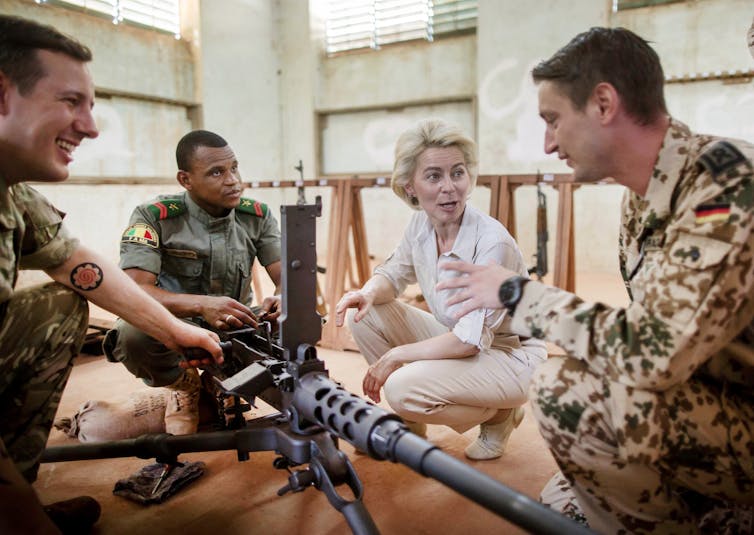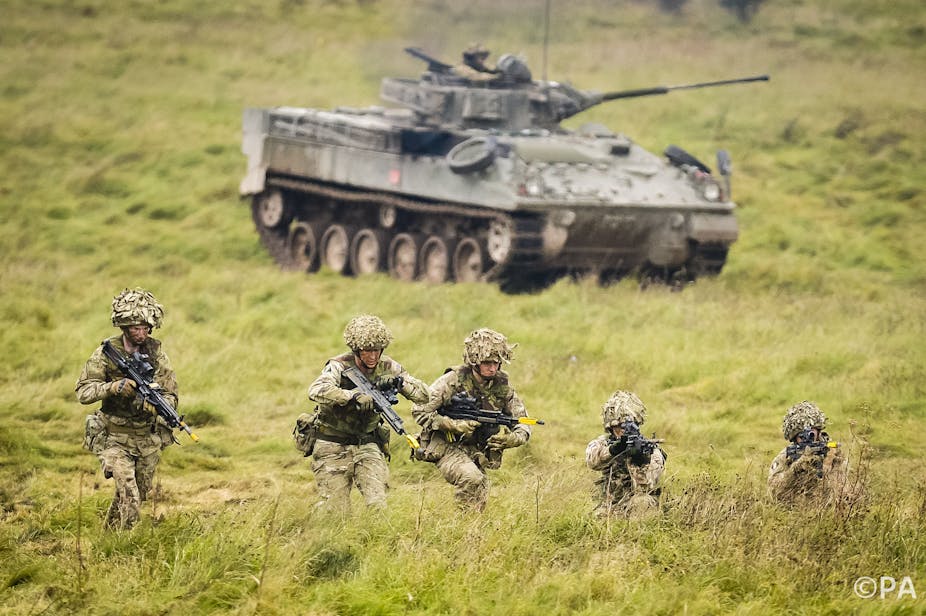As part of a warning by a group of former military officers that the European Union undermines the UK’s military effectiveness, former General Sir Michael Rose expressed concern at the EU’s plan to set up its own army.
But in a speech on May 9 outlining why the UK would be more secure if it remained in the EU, the prime minister, David Cameron, said suggestions of an EU army were “fanciful” and that the UK would veto any suggestion of it.
As Cameron pointed out, there is a significant gap between the rhetoric and reality of the establishment of a fully functional European army.
The creation of a European army is a long way off and by no means inevitable. Even the most supportive nations, such as Germany, would acknowledge this reality.
As defence falls within the intergovernmental sphere of EU law, any single member state can veto its creation ensuring that the prospect of the UK getting dragged into an EU army against its will is zero. In fact, one could argue that the UK remaining inside the EU would do more to prevent an EU army than a Brexit would.
No consensus
In truth, EU member states and especially the so-called “big three” – France, Germany and the UK – would have to be fully committed to the project politically. They would also have to strategically reconfigure everything from defence budgets to capabilities to chains of commands to align with the goal of an EU army. There are absolutely no signs of this transpiring in the near future – and not just because the UK has been the traditional foot-dragger.
It is no secret that the UK has been a reluctant champion of the EU’s Common Security and Defence Policy (CSDP) for some time. Yet for different reasons and in different ways, France and Germany have also been less than willing to invest much more than rhetoric to the D in CSDP of late too, never mind to a full-blown EU army.
France – historically the traditional advocate of European defence – has lost confidence in her EU partners due to their reluctance to commit to EU operations. And although a general promoter of multilateralism, Germany still sidesteps the issue of how and when to use force in response to the threats it identifies.

Amid the acrimony of the Brexit debate, one can be forgiven for thinking that the UK is the only EU state that jealously protects its sovereignty. The reality is that the protection of sovereignty by all member states is the key restraint to the formation of an EU army. This is not just due to some limited understanding of the concept of sovereignty.
EU member states have not moved forward in this area for the simple reason that they do not have the confidence that their interests, threat perceptions, politics and strategic cultures will align sufficiently to warrant such a loss of sovereignty. Individual nations are not yet prepared to abandon national privileges and traditions for the Europeanisation of defence.
EU security forces already work together
While the prospect of a truly EU Army is indeed “fanciful”, the EU is no stranger to providing security forces. This is party through the European countries in NATO but also through the Eurocorps, an intergovernmental military corps of about 1,000 soldiers based on the Franco-German Brigade in Alsace, France.
More recently, CSDP missions missions, beginning in 2003, have ranged from stabilisation missions in the Democratic Republic of Congo and former Yugoslavia to anti-piracy operations in the Gulf of Aden.

Military cooperation with other European states has been a traditional part of the post-World War II security governance community established in and emanating from the Euro-Atlantic community.
What conditions for an EU army?
A recent European Union Institute for Security Studies (EUISS) report envisioned no fewer than five futures for European defence including a “integrated European army” that would significantly enhance “Europe’s capability contributions to NATO”. Even the most ardent supporters of an EU army, including Jean-Claude Juncker, the European Commission president, are quick to state that it would not be in competition with NATO.
An EU army is such a distant and uncertain likelihood that making predictions on the implications for NATO and European security is a fool’s errand. In order for a future EU army to be established, Europe would have to be considerably more politically integrated with corresponding strategic ambitions and complementary attitudes on the use of force.
This would also necessitate a commitment to an equitable sharing of the burden vis-a-vis the US and the provision of European security. For their part, the US now seem much less concerned with the form EU defence takes than just encouraging their allies to spend more on it.
Of course, external forces could also drive more integration including a significant US abandonment of European defence (disengaging from NATO for example), coupled with considerably intensified security threats from Europe’s eastern and southern flanks. It may come down to the unsustainable cost of maintaining 28 individual armed forces with intensified economic stagnation and swelling defence costs.
A true EU global strategy remains a chimera. Permanent Structured Cooperation, an EU Treaty instrument for potential deeper EU defence integration, so far only exists on paper. EU battlegroups – units of troops ready to deploy at short notice – have existed conceptually since 2007 but they have yet to be deployed in any of the EU’s 37 missions and a permanent EU operational headquarters remains blocked by member states.
In fact, the notion of an EU army is more important as a construct than it is a real alternative. It would be in European states’ defence interests to make more out of NATO and in their security interests to make more out of the EU.

